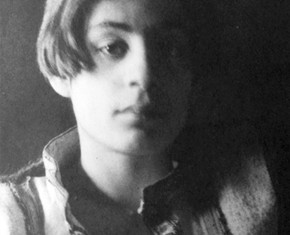The views expressed in our content reflect individual perspectives and do not represent the authoritative views of the Baha'i Faith.
Can a leopard change its spots? Obviously, no. But can human beings, on the wrong track in life, change their outlook, their behavior, and ultimately their souls?
A juvenile delinquent, a thug, and a bully as a child and a young man, Fred Mortensen’s life began to change when his Public Defender, Albert Hall, a Baha’i, saw something deeper and better in Fred.
RELATED: Can a Leopard Change its Spots – and Can We Change Ourselves?
When Albert Hall gave Fred Mortensen the message of the Baha’i teachings, it wound up changing not only the leopard’s outer spots of resentment resulting from childhood neglect and whose leadership potential was being used to encourage others in unlawful and criminal behaviors, but Fred’s entire inner life.
Hall recognized the potential of the spiritual leadership this young man could develop. Attorney Hall, influenced by Abdu’l-Baha’s teachings in relation to criminal justice, wrote of the need for the penal system to be guided by justice, not by revenge. In at least one instance Abdu’l-Baha referred to “the correction of criminal and disorderly elements.” That word – correction – indicates that the leopard can indeed change its spots.
Once Mortensen’s heart and soul transformed themselves with the influence of the Baha’i teachings, he became an ardent believer, gifted with the bounty of not only meeting Abdu’l-Baha but also of spending a week with him, receiving loving guidance and inspiration.
A year later, a letter from Abdu’l-Baha to Fred Mortensen prophesied: “That trip of thine from Minneapolis to Green Acre will never be forgotten. Its mention will be recorded eternally in books and works of history.”
Thirty-two years later, Shoghi Effendi, the Guardian of the Baha’i Faith, wrote in God Passes By:
A survey, however inadequate, of the varied and immense activities of Abdu’l-Baha in His tour of Europe and America cannot leave without mention some of the strange incidents that would often accompany personal contact with Him. The bold determination of a certain indomitable youth who, fearing Abdu’l-Baha would not be able to visit the Western states, and unable himself to pay for a train journey to New England, had traveled all the way from Minneapolis to Maine lying on the rods between the wheels of a train …
After he became a Baha’i and met Abdu’l-Baha, Fred Mortensen moved to the South to work for racial amity. There he used his natural leadership skills to organize numerous successful proclamation events for teaching the Baha’i Faith, bringing in many excellent speakers. Louis Gregory, an African-American attorney who gave up his law practice to travel full time through the South for the same purpose, took to calling Mortensen, “Frederick the Great.”
Thinking of his mother, Fred had mixed emotions, sad for what he put her through yet happy that her hopes for him finally came true. He mused:
My dear mother had done everything in her power to make me a good boy. I have but the deepest love for her and my heart has often been sad when thinking how she must have worried for my safety as well as for my future well-being. Through it all and in a most wonderful way, with a god-like patience, she hoped and prayed that her boy would find the road which leadeth to righteousness and happiness.
When the American Baha’i Community wished to send funds to the Holy Land to assist with Abdu’l-Baha’s humanitarian work, the Master, unsure if a trip to the Holy Land could be accomplished due to the war, nevertheless sanctioned their desire to attempt it. However, He refused to approve the person selected by the Baha’i Temple Unity to make the trip, insisting instead that he would only agree if Fred Mortensen served as their representative. The change was made, yet Fred’s ship, as the Master had feared, was turned back. The journey could not be completed nor the monies delivered.
Fred moved again, as a homefront pioneer to Montana, where he personally financed publicity and published many articles about the Faith in local newspapers. According to his great-grandson Justin Charles Martin Penoyer’s thesis:
In one instance, he felt obliged to correct an article printed in the Montana Record Herald, which gave credit for the conception of the League of Nations to an unspecified king of France. Encouraged by friends in Helena, he wrote a letter to the paper in which he clearly stated that Baha’u’llah, founder of the Baha’i Faith, had revealed the basic principles of the League at least fifty years before it was established; furthermore, these same principles were explained by His son Abdu’l-Baha in a book titled The Secret of the Divine Civilization, written in 1875. A few years later, Fred wrote an essay titled “The Three Great Lights,” in which he eloquently described the nature of progressive revelation. This essay was published in the March 1925 edition of the Star of the West.
In 1922 Fred met and married Kathryn May Rubeck and was happy to welcome her infant son as his own, especially because he’d given up hope of ever having children. They went on to have four more children together, in rapid succession, and he remembered that Abdu’l-Baha once told him he would receive “four blessings.” These children, he believed, were those blessings.
RELATED: The Journey from Criminal to Spiritual
After a 1925 earthquake caused their home in Helena, Montana to be destroyed by fire, the Mortensens relocated to Chicago to be near the Baha’i House of Worship. Fred worked nights at the Chicago Tribune, and devoted the majority of his days to his family and his Faith.
Penoyer relates:
Every night he went over his children’s homework, and he made sure they were well fed and properly clothed. In addition to their school studies, he was very involved in their sports activities and other interests; and, most important, he taught them the words of Baha’u’llah, stressing the importance of love in all facets of society. His children all became dedicated Baha’is.
His daughter, Kathryn, remembers him as ‘a standard of fatherhood’ whom she viewed as a saint.
An activist for workers’ rights, Mortensen helped form unions and fought for age limitations, a fair minimum wage, and safer working conditions.
All the remarkable things that happened to this delinquent-turned-disciple, and that he in turn, did for family, society and within the Baha’i community, Fred Mortensen credited to a spiritual transformation:
… the Word of God gave me a new birth, made me a living soul, a revivified spirit. I am positive that nothing else upon the earth could have changed my character as it has been changed. I am indeed a new being, changed by the power of the Holy Spirit …
At the end of World War II in 1946, with his children grown, Fred wished to serve the Baha’i Faith abroad. Fred made plans to go to Europe but before he could depart fell ill and died of a cerebral hemorrhage on June 13th of that year.
On learning of Fred’s death, the Guardian cabled the Mortensen family:
Grieve passing beloved Fred. Welcome assured in Abha Kingdom by [Abdu’l-Baha]. Praying progress his soul. His name is forever inscribed Baha’i history.
Fred was buried at Cedar Park Cemetery, Chicago, IL. Per his request, his autobiographical account, When a Soul Meets the Master, was read at the service. His obituary in the “In Memoriam” section of the Baha’i World, Vol. XI, quotes his daughter, Mrs. Kathryn Mortensen Penoyer:
My father lived and practiced the Baha’i Religion to a degree beyond possible explanation … On the very eve before his death he spent his last time teaching the Faith of Baha’u’llah. His devotion cannot be measured in mere words, they are not powerful enough.
Fred Mortensen’s story is now also included in many books, including Alan Ward’s 239 Days; H. M. Balyuzi’s Abdu’l-Baha — The Centre of the Covenant, The Baha’i World, Volumes X and XI; Mahmud’s Diary; Roger White’s Verdict of a Higher Court in Another Song, Another Season; and on a website dedicated to him which includes the thesis of his great-grandson, Justin Charles Martin Penoyer. His story has also been immortalized in song: Fred Mortensen, by Mike and Bev Rogers, and Riding the Rods, by Larry Magee. Fred’s great-grandson closed out his thesis with these words, an appropriate summary of Fred’s remarkable life:
Fred Mortensen’s background was that of a rogue and thief. Fred was not an advantaged person, and as such would not be a likely candidate to understand, let alone embrace, a new religion. He lived his beliefs without benefit of wealth or education, much like his mentor, Abdu’l-Baha. He was so moved by his exposure to Baha’i teachings that the direction of his life changed instantly. The facts suggest a metamorphosis on a level other than scholarly.
Fred’s story is well known in Baha’i history. The documentation is the result of his example of faith in action, not of his material accomplishments. Fred perceived a truth more impressive than that of his grinding poverty, more real than his material needs, and more important than his immediate gratification. He is an example of one who learned that material things are transient, while inspiration and faith survive. Such is the power of faith to change a life.
We can all use Fred Mortensen’s story as an example for what is possible when we recognize what needs changing in our own lives – yes, we can change our spots.
















Comments
Sign in or create an account
Continue with Googleor